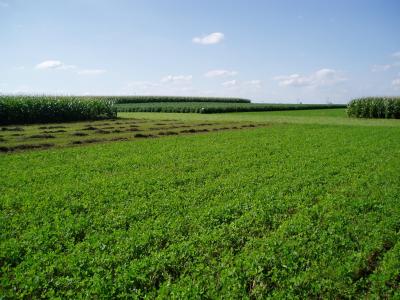We're open daily! View holiday hours
Science News
Sustainable Crop Rotation
May 4, 2010

Crop rotation is standard even in conventional farming. In fact, most of the U.S. corn belt relies on a two-year rotation of corn and soybean with heavy inputs of fertilizer, herbicides and pesticides derived from fossil fuels to achieve high yields and keep costs low.
According to National Geographic, “By some estimates, it takes about 10 calories of fossil fuels to get each calorie of food from farm to fork in the American food system.” This has led some to explore whether there is a more sustainable way to maximize crop yield while minimizing costs.
Well, scientists from Iowa State University have found that if crops are rotated more—over a three or four year period—and include alfalfa or oats, the use of fossil fuels on the farm can be drastically reduced. These results came from a six-year study and were published yesterday in the May/June edition of Agronomy Journal.
What they found is astonishing—between 2003 and 2008, nitrogen fertilizer inputs decreased 66% in the 3-year rotation and 78% in the 4-year rotation. Furthermore, herbicide use decreased 80% in the three-year rotation and 85% in the four-year rotation. Not only that, despite the reduction in energy input, corn and soybean yields matched or exceeded yields attained using the conventional system.
Organic farmers have already have adopted this method of crop rotation. According to Thaddeus Barsotti, co-owner of Capay Organic and Farm Fresh To You, “Crop rotation and specifically the planting of cover crops can increase soil fertility in lieu of the use of synthetic fertilizers, which require fossil fuels to produce. Our farm fertility program includes planting cover crops – such as vetch and alfalfa – and applying green waste compost to fields, both natural sources for inputting nitrogen into the soil for access by crops.”
The Iowa State researchers also used manure to reduce fossil fuel use. They “fed cows on corn, oats, and the hay from alfalfa, and then spread the cows' manure back on the fields. This contributed to fossil fuel savings by further reducing the need for synthetic fertilizers to provide received key nutrients like potassium and phosphorous,” according to the National Geographic article.
Barsotti says, “We do not use manure on our farm but it is an important part of many soil fertility programs on diversified operations. I hope that conventional producers begin to look at ways to minimize their use of synthetic fertilizers and chemical inputs – unfortunately, big ag and fertilizer companies are not proponents of moderation. Studies like this one are important to show conventional producers that being a sustainable farming operation can also be financially viable and worthwhile.”
(More science news on conventional farming was published today, for more info, please click to read about Roundup resistance or methyl iodide pesticide use.)
Image by David N. Sundberg